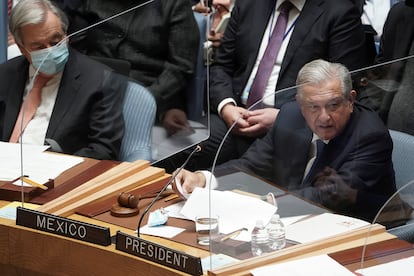López Obrador’s project to establish a global fund against poverty falls by the wayside
In 2021, the Mexican president promised that he would design a Global Fraternity and Welfare Fund and propose it to the UN. This project would attract donations from the world’s wealthiest individuals, companies and countries to assist 750 million people living in poverty

On November 9, 2021, during a session of the United Nations Security Council, Mexican President Andrés Manuel López Obrador drew global attention by making a big proposal. He asked all countries to support the creation of a Global Fraternity and Welfare Fund, which would attract contributions from the richest people, companies and countries, to give a dignified life to 750 million people living in poverty around the world.
The president outlined the plan in general terms, promising that “in the next few days” Mexico would present the program before the UN General Assembly. The president’s proposal wasn’t echoed among other countries, which noted that the Security Council wasn’t the ideal place for this subject matter. Months later, López Obrador lamented the lack of support from nations.
Nearly two years after he formulated his plan, there is no evidence that the Mexican government has presented it to the General Assembly, nor that any progress has been made in its creation. This has been confirmed by the Office of the Presidency, the Ministry of Foreign Affairs and the Ministry of Finance, through responses to requests for transparency made by the Mexican civil organization Fundar. This association — which specializes in tax justice — asked these three agencies for documents showing the progress of the preparation of the plan. The institutions offered similar responses: “The requested information is not in our files,” or “no documents containing the information were located” — official ways of saying that what has been requested simply doesn’t exist.
To corroborate the institutional positions, EL PAÍS reached out to the communications offices of the three aforementioned agencies. After a week of waiting, the officials consulted still didn’t respond. In the case of the Ministry of Foreign Affairs, it was expressly asked if the Mexican government presented López Obrador’s altruistic proposal to the UN General Assembly in 2021 or 2022. The agency didn’t answer this question, either. However, among the publicly-available documents presented by Mexico in the regular sessions of the United Nations in both years, López Obrador’s project doesn’t appear.
While outlining his plan in November 2021, the president said the Global Fraternity and Welfare Fund would make $1 trillion available annually through three sources of funding: the voluntary donation of 4% of the fortunes of the richest people, a similar contribution from the 1,000 largest corporations, as well as the contribution of 0.2% of GDP from each member country of the G-20.
López Obrador’s proposal criticized the “lethargy” of the UN. According to the president, the experience of the pandemic demonstrated that pharmaceutical corporations had resoundingly imposed themselves on the Covax mechanism and that the UN had become an inconsequential institution. “Never in the history of this organization has anything really substantial been done to benefit the poor, but it’s never too late to do justice. Today is the time to act against marginalization, addressing the causes and not just the consequences [of poverty],” he said from New York City.
López Obrador explained that the resources collected by the fund would be delivered directly to the beneficiaries of the entire planet — without the intermediation of civil organizations — in the form of scholarships for students, pensions for the elderly, support for children with disabilities, aid to peasants and payments to young people who work as apprentices. To determine the target population, the president suggested that, starting in 2022, the World Bank and the International Monetary Fund (IMF) would carry out a “census of the poorest [people] in the world.” These guidelines were a replica of the policy model implemented by López Obrador in Mexico: censuses controlled by the government (and parallel to those carried out by technical agencies) and the distribution of resources through social programs, tinged with distrust of civil society organizations.
Iván Benumea — the coordinator of Fundar’s Tax Justice Program — says that, rather than focusing on the silence of UN member states when it came to the president’s proposal, it’s more urgent to talk about the pending issues in Mexico in terms of tax policy, wealth redistribution and combating inequality. The specialist points out that, although López Obrador’s administration has implemented some actions to reduce the concentration of wealth — such as the fight against tax evasion and the increase in the minimum wage — there are still challenges when it comes to making large firms and the richest individuals pay proportional taxes. Of the 34 OECD countries, Mexico has the lowest level of tax collection with respect to its GDP.
“It’s essential that taxes be implemented, to reduce the concentration of wealth that some individuals have in this country,” Benumea says. In Mexico, “it’s estimated that 50% of the wealth — all the assets and goods, which include houses, land, companies, etc. — is in the possession of the richest 1% of this country,” he affirms. “These phenomena could be addressed if the Mexican state would charge more taxes to people who have more, and then redistribute those resources in favor of public policies, such as the construction of hospitals, the transfer of resources to lower-income households, or increasing funds for social programs, which have had favorable results in reducing poverty. There are many options of what could be done with those resources that, today, are definitely concentrated among very few people.”
The specialist maintains that the so-called tax benefits should be reviewed. These loopholes allow companies and the very rich to pay less taxes through various deductions and exemptions. Property taxes — as well as taxes on capital transactions, net wealth and inheritance — are practically nil. In the same way, Benumea points out, the laws could be strengthened to require multinationals to pay their taxes in Mexico, as it’s the country where they generate their income. They shouldn’t be allowed to evade their obligations by transferring their wealth to tax havens.
“Action must be taken as soon as possible, because dealing with these challenges — in terms of financing for social policy, to contribute even more to reducing inequalities and poverty and guaranteeing human rights — definitely requires a bigger budget. And, at some point, a more ambitious tax reform will be needed, if López Obrador really wants to contribute to achieving all his social policy proposals,” Benumea concludes.
Sign up for our weekly newsletter to get more English-language news coverage from EL PAÍS USA Edition
Tu suscripción se está usando en otro dispositivo
¿Quieres añadir otro usuario a tu suscripción?
Si continúas leyendo en este dispositivo, no se podrá leer en el otro.
FlechaTu suscripción se está usando en otro dispositivo y solo puedes acceder a EL PAÍS desde un dispositivo a la vez.
Si quieres compartir tu cuenta, cambia tu suscripción a la modalidad Premium, así podrás añadir otro usuario. Cada uno accederá con su propia cuenta de email, lo que os permitirá personalizar vuestra experiencia en EL PAÍS.
¿Tienes una suscripción de empresa? Accede aquí para contratar más cuentas.
En el caso de no saber quién está usando tu cuenta, te recomendamos cambiar tu contraseña aquí.
Si decides continuar compartiendo tu cuenta, este mensaje se mostrará en tu dispositivo y en el de la otra persona que está usando tu cuenta de forma indefinida, afectando a tu experiencia de lectura. Puedes consultar aquí los términos y condiciones de la suscripción digital.









































